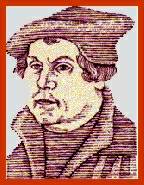|
PinkMonkey Online Study Guide-World History
Anti-Papal Attitude of Kings
Many Kings in Europe were against the Pope for several reasons. These monarchs who resented the Church’s interference in any of their affairs were in favor of any movement that would weaken the power of the Pope and strengthen their own power.
Anti-Papal Attitude of the People
People in Germany, in the Scandinavian countries as well as in England disliked the Pope for several reasons. They resented the Pope’s interference in non-religious matters. They were also aware of the moral degeneration in the Church and its dogmatic attitude. They were against the Pope as they were forced to make payments to the Church at Rome on several pretexts. Thus they favored a strong monarchy and were against the Papacy.
Worship of Mammon
The clergy’s desire of gaining wealth made it appear that they
were worshippers of Mammon rather than of God. There was a sale
of Church offices and benefices, while church rituals and practices
became a source of profits. There was an unrestrained sale of relics
such as objects supposed to have been used by Jesus Christ, the
Virgin Mary, the Apostles and the Saints, as also of holy splinters
from the true cross or from the bones of saints.
Royal Support to Church Critics
Though the opposition to the Church’s malpractice was slowly growing in strength, it burst into a storm with the realization that it had the support of several people including the kings and the nobles.
Immediate Cause of the Reformation and its Outbreak
The Church was affected by cumulative forces such as the attitude of the kings, the people’s desire to reform the Church, the corrupt lives and arrogance of the clergy, the Renaissance spirit and the influence of great writers and readers.

Exhibit 4.1
Martin Luther
One such outstanding leader was Martin Luther (1483-1546), the first reformer to read a large number of people to openly break with the Church. Luther was a native German who became a monk at the age of twenty-two and was then appointed as professor of theology in the University of Wittenberg. A popular teacher and preacher, he was fearless in stating his opinions. He openly questioned the sale of indulgences in 1517 by several agents of Pope Leo X, for collecting money for completing the construction of St. Peter’s Church at Rome. He was aroused by Tetzel, one of these agents, and on the church door at Wittenberg he posted his 95 Theses which were statements on points of difference in the beliefs and practices of the Church. Luther offered to debate with all visitors his theses in which he attacked indulgences which were promises of special favors after death. In 1520, Luther was excommunicated by Pope Leo X who requested the Holy Roman Emperor, Charles V to punish him as a heretic. Though the emperor wanted to punish Luther and his followers, there were several people in Germany such as princes and noblemen, priests and monks who even supported Luther. Thus he succeeded in defying the emperor and also the Pope. Luther was asked to come before the Imperial Diet or Church Council at Worms in 1520-21, where he refused to take back anything he had said. He advocated that "it is neither right nor safe to act against conscience". He also maintained that his statements were not contradictory to the Bible.
[next page]
|